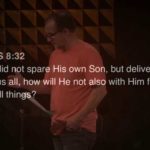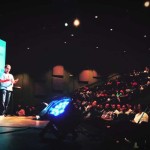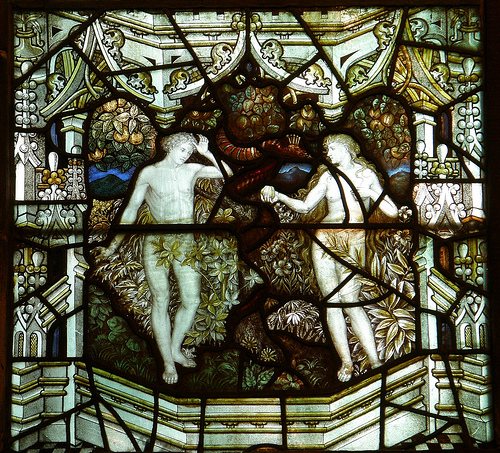We run our website the way we wished the whole internet worked: we provide high quality original content with no ads. We are funded solely by your direct support. Please consider supporting this project.
Judgment and Idolatry
Why was the forbidden tree in the center of the garden called The Tree of the Knowledge of Good and Evil? Since the Bible depicts eating from this tree as the reason humans are estranged from God and the cause of all that’s wrong with humanity, eating from this tree is obviously a terrible thing. But what’s so terrible about acquiring “knowledge of good and evil?” Why wouldn’t God want Adam and Eve to possess this knowledge?
The Hebrew concept of “knowledge” used here goes much deeper than mere intellectual knowledge. Rather, the concept of “the knowledge of good and evil” connotes an attempt by humans to define and experience good and evil on their own—apart from God. Eating from this tree represents a rebellion against God, for we are aspiring to be “wise like God” in the sense of grasping for moral autonomy—an exercise of sovereignty that is appropriate to God alone.
This is exactly what the serpent tempted Eve with. “[W]hen you eat of it,” he said, “your eyes will be opened, and you will be like God, knowing good and evil” (Gen 3:5). Eating from the forbidden tree represents our rebellious attempts to position ourselves as judges rather than leaving all judgment to God, as the bible consistently commands (e.g. Rom 14:10; James 4:11-12).
By eating from the forbidden tree, Eve was guilty of idolatry. Accepting the serpent’s false and untrustworthy depiction of God, Eve stopped trusting God to be her source of life and instead turned to the forbidden tree as a new source of life. This is idolatry.
Such idolatry causes us to define and experience as “good” all that gives us a sense of life. Conversely, everything that threatens our idolatrous sources of life is instinctively defined and experienced as “evil.” In other words, our idolatrous hunger unconsciously creates its own version of the Tree of the Knowledge of Good and Evil. We habitually see and experience the entire world through a filter of our self-serving judgments of good and evil.
The love that reflects the reign of God ascribes worth to others, at cost to oneself. In direct opposition to this, the judgment that reflects rebellion against God ascribes worth to oneself, at cost to others, and in rebellion against God’s own determination. Judgment, in other words, is the direct antithesis of agape love.
Put simply: We can’t possibly ascribe unsurpassable worth to others at cost to ourselves, while at the same time detracting worth from others to ascribe worth to ourselves.
Judgment is the antithesis of the kind of love that God always intended humans to receive and express to one another. It’s the antithesis of the kind of love that expresses God’s life and therefore the life of the kingdom.
I’m convinced this is why the Bible teaches that the Tree of the Knowledge of Good and Evil was placed in the center of the garden with the Tree of Life. Life as God intends it revolves around trusting God for his provision while obediently honoring God’s prohibition. This means we are to trust God’s provision of life while honoring God’s prohibition against judgment. And we cannot trust God’s provision of life while we participate in judgment.
The forbidden tree wasn’t some arbitrary test God put in the garden to tempt Adam and Eve. We should rather think of it as a sort of “No Trespassing” sign God lovingly gave to his first children. God was, in effect, teaching them—and us as well—that for life to be lived the way he intended it, for our life to manifest the beautiful kingdom of God, we must never think we can define and experience good and evil apart from him. When we try to do this, we are no longer trusting him for life and we immediately lose our capacity to receive his life and thus love like he loves.
The moment we become judgers, we stop being lovers. The moment we eat from the forbidden tree, we’re blocked from access to the Tree of Life (Gen 3:22-24).
Category: General
Tags: Adam and Eve, Idolatry, Judgment, Love, Tree of the Knowledge of Good and Evil
Topics: Following Jesus
Related Reading

When Our Images of God are Faulty
I’m fleshing out the third proclamation of the ReKnew Manifesto, which challenges us to rethink our conception of God. In the previous post I noted that, since our relationship with God is mediated through our mental picture of him, our image completely determines how we feel about God and what our relationship with him will…

The Rule of Love
The traditional confession that Scriptura sacra sui ipsius interpres (“Sacred Scripture is its own interpreter”) presupposes that there is one divine mind behind Scripture, for example. Moreover, Church scholars have traditionally assumed that Scripture’s unity can be discerned in a variety of concepts, motifs, themes and theologies that weave Scripture together. And to speak specifically of the…

Lighten Up: America is NOT the Kingdom of God
For some thoughts from Greg on the 4th of July and the Kingdom of God, see The Birth of Two Kingdoms: A Fourth of July Reflection. And now for one of the most ridiculous examples of confusing the Kingdom of God with America. This would be…

Hungry Hearts
Every human being with normal mental and emotional faculties longs for more. People typically associate their longing for more with a desire to somehow improve their lot in life—to get a better job, a nicer house, a more loving spouse, become famous, and so on. If only this, that, or some other thing were different,…

How God Judges Sin
In his third sermon covering material from his book Crucifixion of the Warrior God, Greg explores the topic of judgment. In this clip, Greg suggests that while God certainly does judge sin, how he judges is very different than we might expect. You can view the entire sermon here on the Woodland Hills Church site. You can find the…

Sermon Clip: Extravagant Forgiveness, Extravagant Love
Greg Boyd had the wonderful opportunity to guest speak at a great church in Carlisle, PA called Carlisle BIC. He spoke on the topic of forgiveness and love. In this short clip, Greg describes how a prostitute was being judged by the Pharisees, but Jesus came to her rescue. You can listen to the full…

